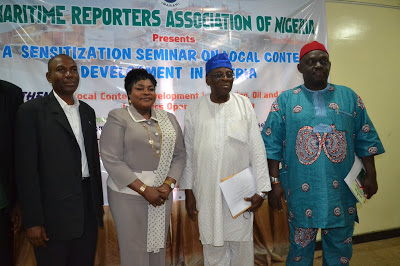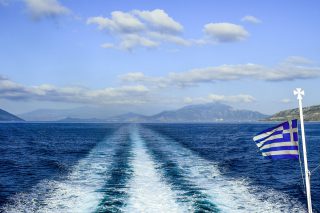 |
maritime and oil & gas sectors have been charged to improve implementation
of local content policies in order to enable creation of indigenous companies
and employment in the two sectors.
The stakeholders at a one-day a one-day sensitization
seminar on “Local Content Development in Shipping, Oil and Gas Logistics
Operation in Nigeria,” organised by Maritime Reporters Association of Nigeria(MARAN) in Apapa Lagos on Tuesday, called on the Nigerian National Petroleum
Corporation, NNPC, the Nigerian Maritime Administration and Safety Agency,
NIMASA, the Nigerian Content Development and Monitoring Board,
NCDMB, to implement, with full force, existing local content laws and policies,
such as Coastal and Inland Shipping (Cabotage) Act of 2003, which gives
Nigerian vessels the right of first refusal in lifting cargoes from
the country’s waters.
delivering a lecture titled, “Seafarers Perspective on Local Contenet
Development in Oil & Gas Shipping Logistics Operation,” said that the
Ministry of Transport was allowing foreign shipping lines freedom to employ
engage foreigners seafarers on oil vessels.
seafarers in our waters are foreigners. We need to have a very clear policy
regime on how to acquire the vessels on which the local seafarers
can work.
we do not know where they work. There is need to know the reality of the
situation. A few weeks ago the largest vessel in oil and gas industry berthed
in Lagos, the Egina and this is a good example on the way to follow. We must
find how to integrate Nigerians into the oil and gas sector in all of its
ramifications.”
two years, 407 vessels called on Nigerian ports, with none having Nigerians on
board as workers.
its seafarers, we can be sure of about 5,000 Nigerians onboard that vessel.
Nigeria has spent about $15 billion to support foreign trade in the last few
years, but the question is how much are we getting back?
coast line. Nigeria’s maritime domain alone can support her economy,” he
noted.
Martins Enebeli, charged
maritime reporters to follow strictly, Section 22 of the 1999 Constitution of
the Federal Republic of Nigeria, which mandates them to hold leaders accountable
for the benefit of Nigeria.
Nigerian seafarers who are detained without trial, or without tangible evidence
of crime against them.
responsibilities in the area of Cabotage Act implementation, submitting
that “there are no illegalities in our waters, but the bureaucracies in the
industry are the bane of its development.”
most of these things. There about 21 agencies of government in the maritime and
oil and gas environment, but they are not achieving results,” Enebeli noted.
 |
maritime and oil & gas sectors have been charged to improve implementation
of local content policies in order to enable creation of indigenous companies
and employment in the two sectors.
The stakeholders at a one-day a one-day sensitization
seminar on “Local Content Development in Shipping, Oil and Gas Logistics
Operation in Nigeria,” organised by Maritime Reporters Association of Nigeria(MARAN) in Apapa Lagos on Tuesday, called on the Nigerian National Petroleum
Corporation, NNPC, the Nigerian Maritime Administration and Safety Agency,
NIMASA, the Nigerian Content Development and Monitoring Board,
NCDMB, to implement, with full force, existing local content laws and policies,
such as Coastal and Inland Shipping (Cabotage) Act of 2003, which gives
Nigerian vessels the right of first refusal in lifting cargoes from
the country’s waters.
delivering a lecture titled, “Seafarers Perspective on Local Contenet
Development in Oil & Gas Shipping Logistics Operation,” said that the
Ministry of Transport was allowing foreign shipping lines freedom to employ
engage foreigners seafarers on oil vessels.
seafarers in our waters are foreigners. We need to have a very clear policy
regime on how to acquire the vessels on which the local seafarers
can work.
we do not know where they work. There is need to know the reality of the
situation. A few weeks ago the largest vessel in oil and gas industry berthed
in Lagos, the Egina and this is a good example on the way to follow. We must
find how to integrate Nigerians into the oil and gas sector in all of its
ramifications.”
two years, 407 vessels called on Nigerian ports, with none having Nigerians on
board as workers.
its seafarers, we can be sure of about 5,000 Nigerians onboard that vessel.
Nigeria has spent about $15 billion to support foreign trade in the last few
years, but the question is how much are we getting back?
coast line. Nigeria’s maritime domain alone can support her economy,” he
noted.
Martins Enebeli, charged
maritime reporters to follow strictly, Section 22 of the 1999 Constitution of
the Federal Republic of Nigeria, which mandates them to hold leaders accountable
for the benefit of Nigeria.
Nigerian seafarers who are detained without trial, or without tangible evidence
of crime against them.
responsibilities in the area of Cabotage Act implementation, submitting
that “there are no illegalities in our waters, but the bureaucracies in the
industry are the bane of its development.”
most of these things. There about 21 agencies of government in the maritime and
oil and gas environment, but they are not achieving results,” Enebeli noted.

































































